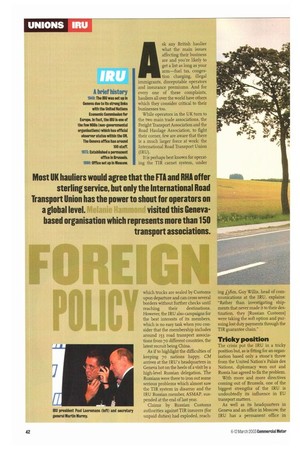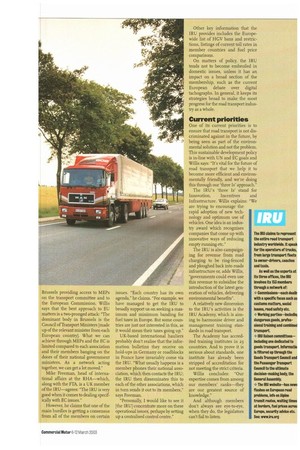Loa
Page 42

Page 43

If you've noticed an error in this article please click here to report it so we can fix it.
lam low
Most UK hauliers would agree that the FTA and RHA offer sterling service, but only the International Road Transport Union has the power to shout for operators on a global level. MPOMIIP H211finulnil visited this Genevabased organisation which represents more than 150 transport associations.
Ask any British haulier what the main issues affecting their business are and you're likely to get a list as long as your arm—fuel tax, congestion charging, illegal immigrants. disreputable operators and insurance premiums. And for every one of these complaints, hauliers all over the world have others which they consider critical to their businesses too.
While operators in the UK turn to the two main trade associations, the Freight Transport Association and the Road Haulage Association, to fight their corner, few are aware that there is a much larger force at work: the International Road Transport Union (IRU).
It is perhaps best known for operating the TIR carnet system, under which trucks are sealed by Customs upon departure and can cross several borders without further checks until reaching their destinations. However, the I RU also campaigns for the best interests of its members, which is no easy task when you consider that the membership includes around 153 road transport associations from 70 different countries, the latest recruit being China.
As if to highlight the difficulties of keeping 70 nations happy, CM arrives at the I RU's headquarters in Geneva hot on the heels of a visit by a high-level Russian delegation. The Russians were there to iron out some serious problems which almost saw the TIR system in disarray and the 1RU Russian member, ASMAP, suspended at the end of last year.
Claims by Russian Customs authorities against TIR insurers (for unpaid duties) had exploded, reach ing L38m. Guy Willis, head of communications at the IRU, explains: "Rather than investigating shipments that never made it to their destination, they [Russian Customs] were taking the soft option and pursuing lost duty payments through the TIR guarantee chain."
Tricky position
The crisis put the IRV in a tricky position but, as is fitting for an organisation based only a stone's throw from the United Nation's Palais des Nations, diplomacy won out and Russia has agreed to fix the problem.
With more and more directives corning out of Brussels, one of the biggest strengths of the IRU is undoubtedly its influence in EU transport matters.
As well as its headquarters in Geneva and an office in Moscow, the IRU has a permanent office in Brussels providing access to MEPs on the transport committee and to the European Commission. Willis says that the best approach to EU matters is a two-pronged attack: "The dominant body in Brussels is the Council of Transport Ministers [made up of the relevant minister from each European country]. What we can achieve through MEPs and the EC is limited compared to each association and their members banging on the doors of their national government ministers. As a network acting together, we can get a lot moved."
Mike Freeman, head of international affairs at the RHA—which, along with the FTA, is a UK member of the IRU—agrees: "The IRU is very good when it comes to dealing specifically with EC issues."
However, he claims that one of the main hurdles is getting a consensus from all of the members on certain issues. "Each country has its own agenda,' he claims. "For extmple, we have managed to get the IRU to broadly support us on seeking a maximum and minimum banding for fuel taxes in Europe. But some countries are just not interested in this, as it would mean their taxes going up."
UK-based international hauliers probably don't realise that the information bulletins they receive on hold-ups in Germany or roadblocks in France have invariably come via the 1RU. "What usually happens is a member phones their national association, which then contacts the IRU; the IRL1 then disseminates this to each of the other associations, which in turn sends it out to its members," says Freeman.
"Personally, I would like to see it [the IRU] concentrate more on these operational issues, perhaps by setting up a centralised control centre."
Other key information that the IRU provides includes the Europewide list of HGV bans and restrictions, listings of current toll rates in member countries and fuel price comparisons.
On matters of policy, the IRU tends not to become embroiled in domestic issues, unless it has an impact on a broad section of the membership, such as the current European debate over digital tachographs. In general, it keeps its strategies broad to make the most progress for the road transport industry as a whole.
Current priorities
One of its current priorities is to ensure that road transport is not discriminated against in the future, by being seen as part of the environmental solution and not the problem. This sustainable development policy is in-line with UN and EC goals and Willis says: "It's vital for the future of road transport that we help it to become more efficient and environmentally friendly, and we're doing this through our 'three Is' approach."
The IRU's 'three Is' stand for Innovation, Incentives and Infrastructure. Willis explains: "We are trying to encourage the rapid adoption of new technology and optimum use of vehicles. One idea is an industry award which recognises companies that come up with innovative ways of reducing empty running etc."
The IRU is also campaigning for revenue from road charging to be ring-fenced and ploughed back into roads infrastructure or, adds Willis, "governments could even use this revenue to subsidise the introduction of the latest generation of vehicles, delivering environmental benefits".
A relatively new dimension to the IRU's activities is the IRU Academy, which is aiming to harmonise driver and management training standards in road transport.
The Academy has accredited training institutes in 23 countries. And to prove it is serious about standards, one institute has already been stripped of accreditation for not meeting the strict criteria,
Willis concludes: "Our expertise comes from among our members' ranks—they
are our greatest of' knowledge."
And although members don't always see eye-to-eye, when they do, the legislators can't fail to listen.
source




































































































































































